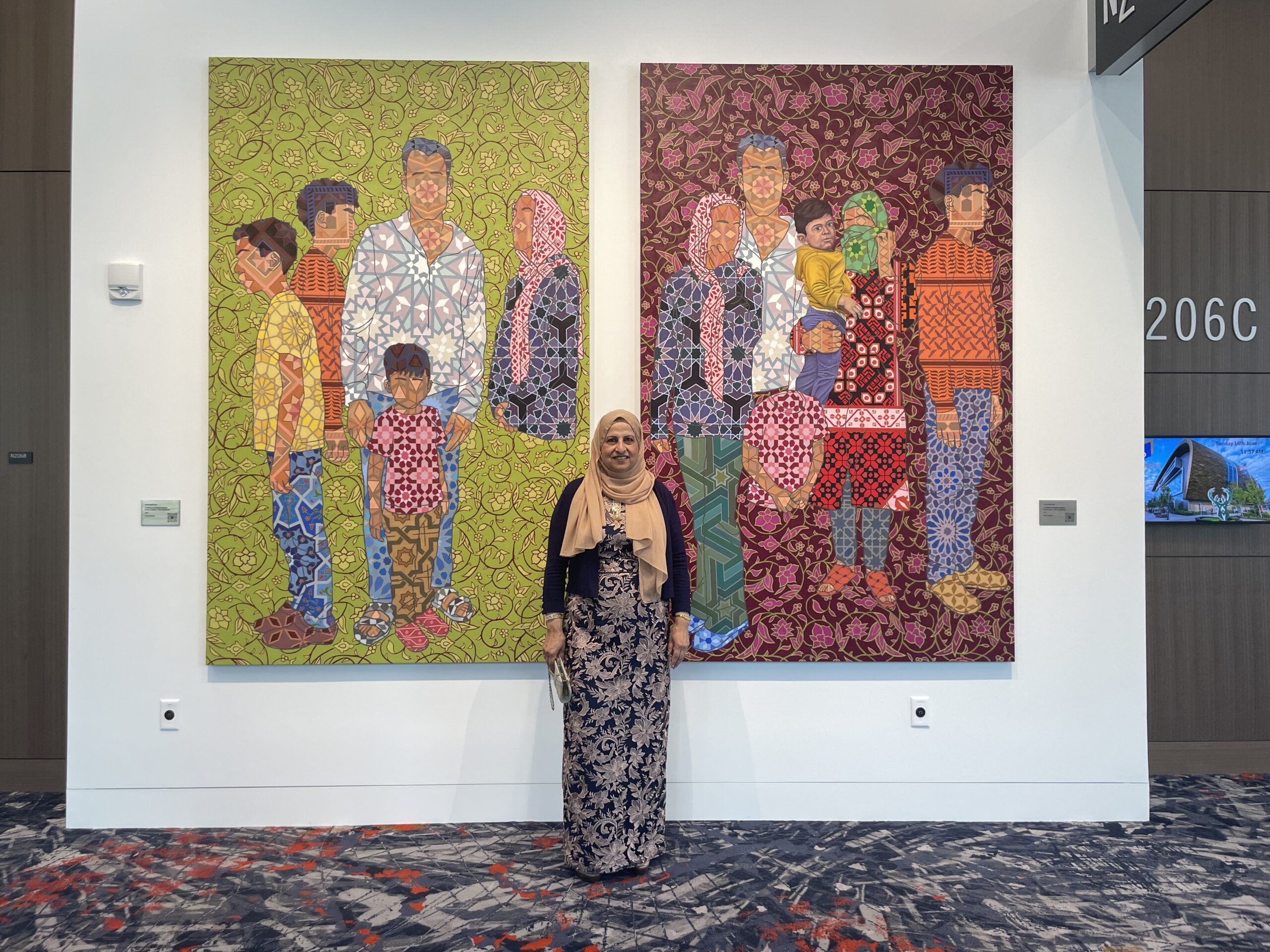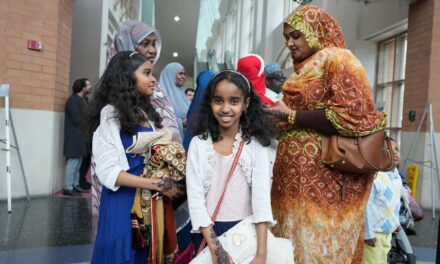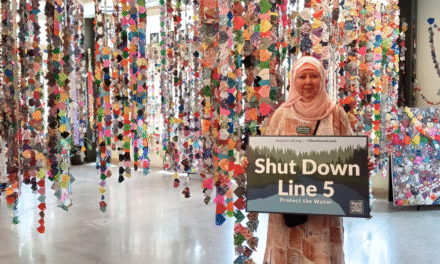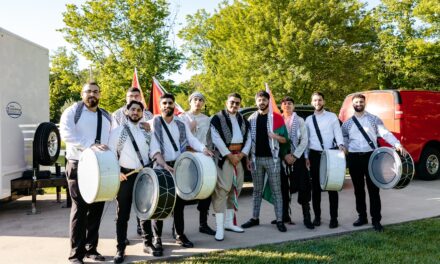Palestinian Janan Najeeb, activist and tireless advocate for justice in Palestine, stands in front of David Najib Kasir’s paintings now a permanent installation in the Baird Center.
Milwaukee’s Baird Center opened its new expansion in May, which features a myriad of public artworks by primarily local artists. These works reflect Milwaukee’s historical, cultural and geographical landscapes. Included in the collection is contemporary oil painter and muralist David Najib Kasir’s two-piece diptych installation “A Pattern of Families Divided by the Greater > Than / Less < Than.”
Originally from Chicago, David Najib Kasir is a graduate of the Milwaukee Institute of Art & Design (MIAD). A first-generation immigrant, Kasir is Syrian-Iraqi Arab, and much of his work incorporates personal themes of identity, family, home and loss inspired by time he spent in Syria growing up. Murals he has done can be found in Uptown Chicago, at the annual O+ Positive Festival in Kingston, New York and in Milwaukee’s Black Cat Alley.
Kasir’s ongoing series “Multiplying the Rubble in Landscapes” depicts Syrian buildings and environments devastated by war and imperialism, painted on panels. He has been working on the series since 2020.
For the Baird pieces, Kasir returned to painting on canvas while taking a similar approach to “Multiplying the Rubble” in terms of social and political themes. “I focused on Milwaukee refugees, specifically Arab refugees in Milwaukee,” he explains.
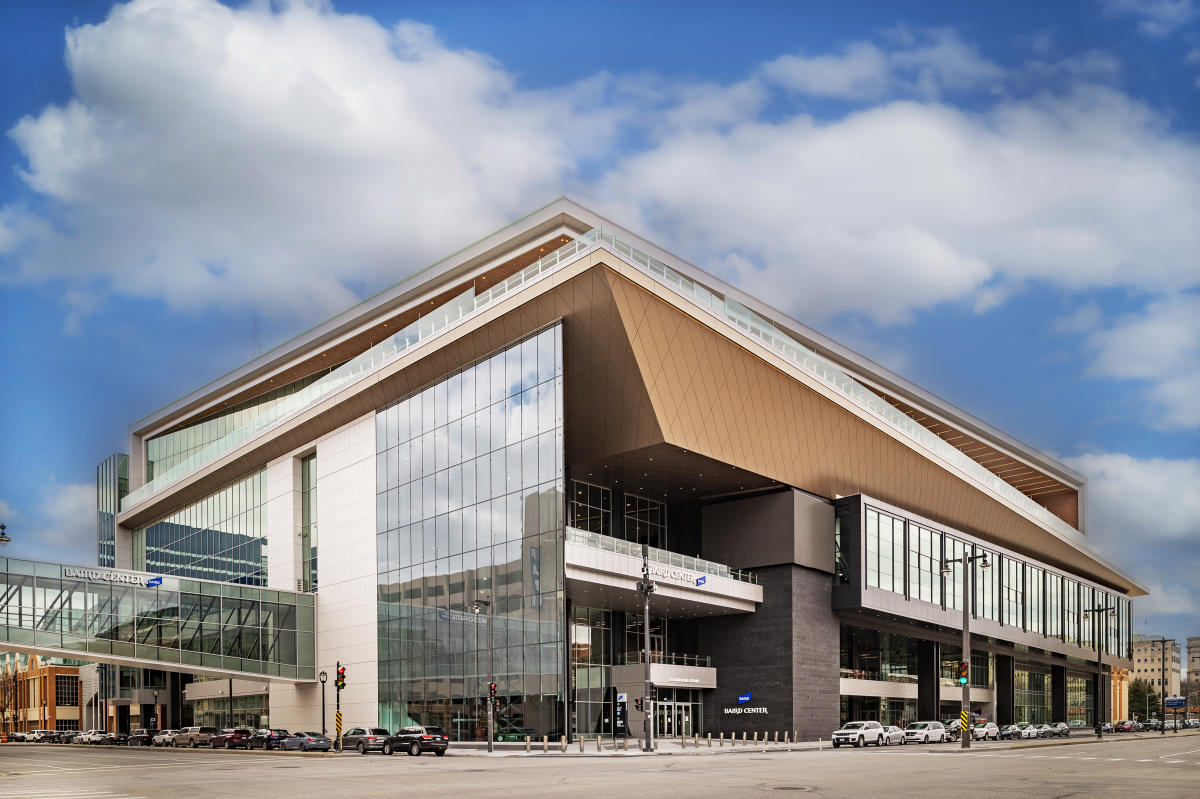
Located at 400 W. Wisconsin Ave, the 2024 renovation at Baird Center includes twenty-one local artists or artists with special ties to the Milwaukee area or have lived in the state.
After a lengthy application process with Baird Center that spanned nearly two years, Kasir notes that “A Pattern of Families Divided by the Greater > Than / Less < Than” he spent more time on than any other painting so far in his career.
With the two diptych paintings, Kasir illustrates the family of Maruf Al Dayea, a Syrian man who fled his country during the civil war and immigrated to the US. Al Dayea’s family comprises his wife, daughter and four sons, each adorned with beautiful Arab mosaic patterns in the pieces.
Some of the figures’ bodies are distorted; for example, one son is missing his head and several are missing legs. Al Dayea’s wife is missing altogether in one painting. Notably, Al Dayea’s infant son is the only one in the painting with a clear, realistic face.
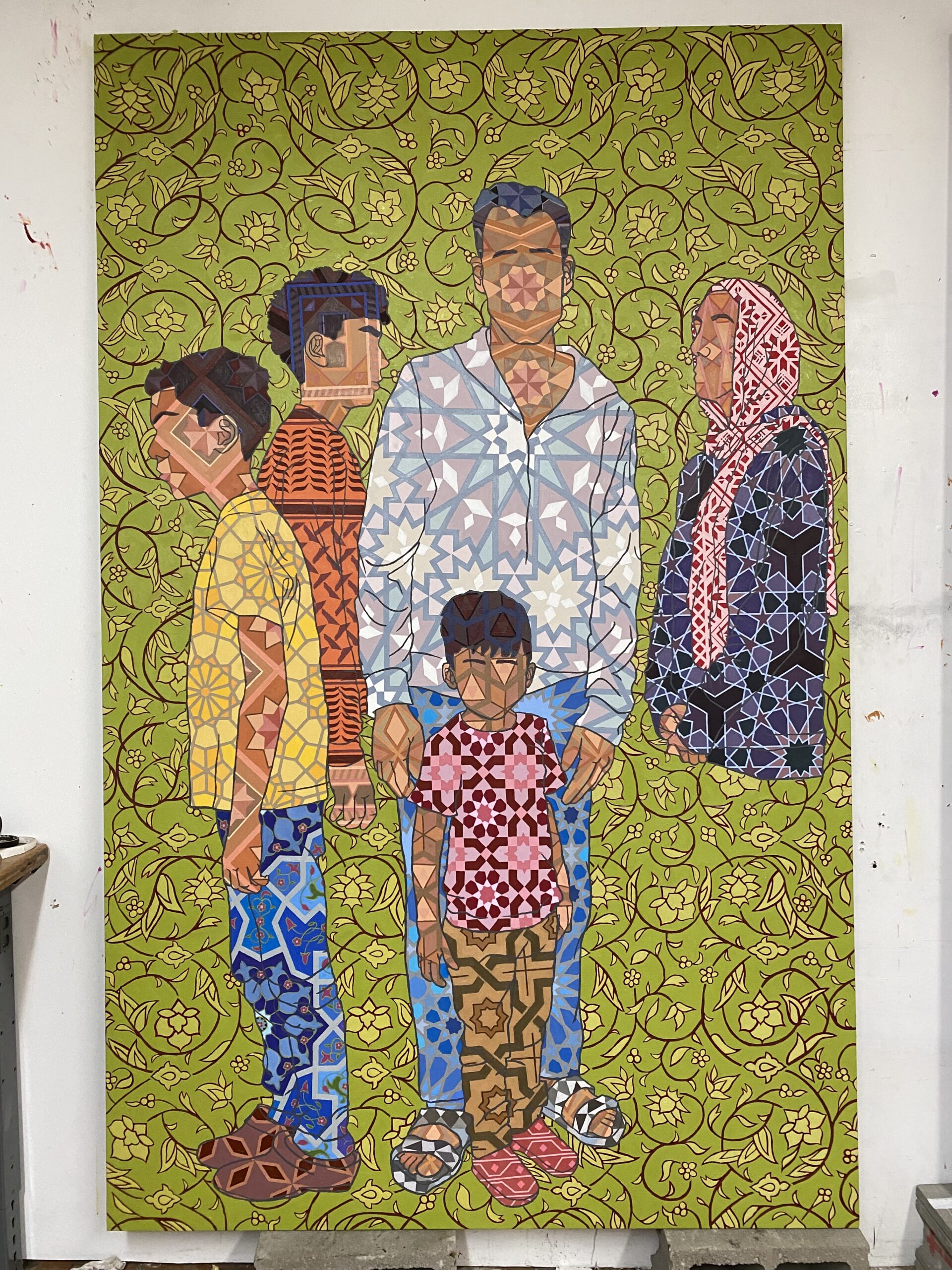
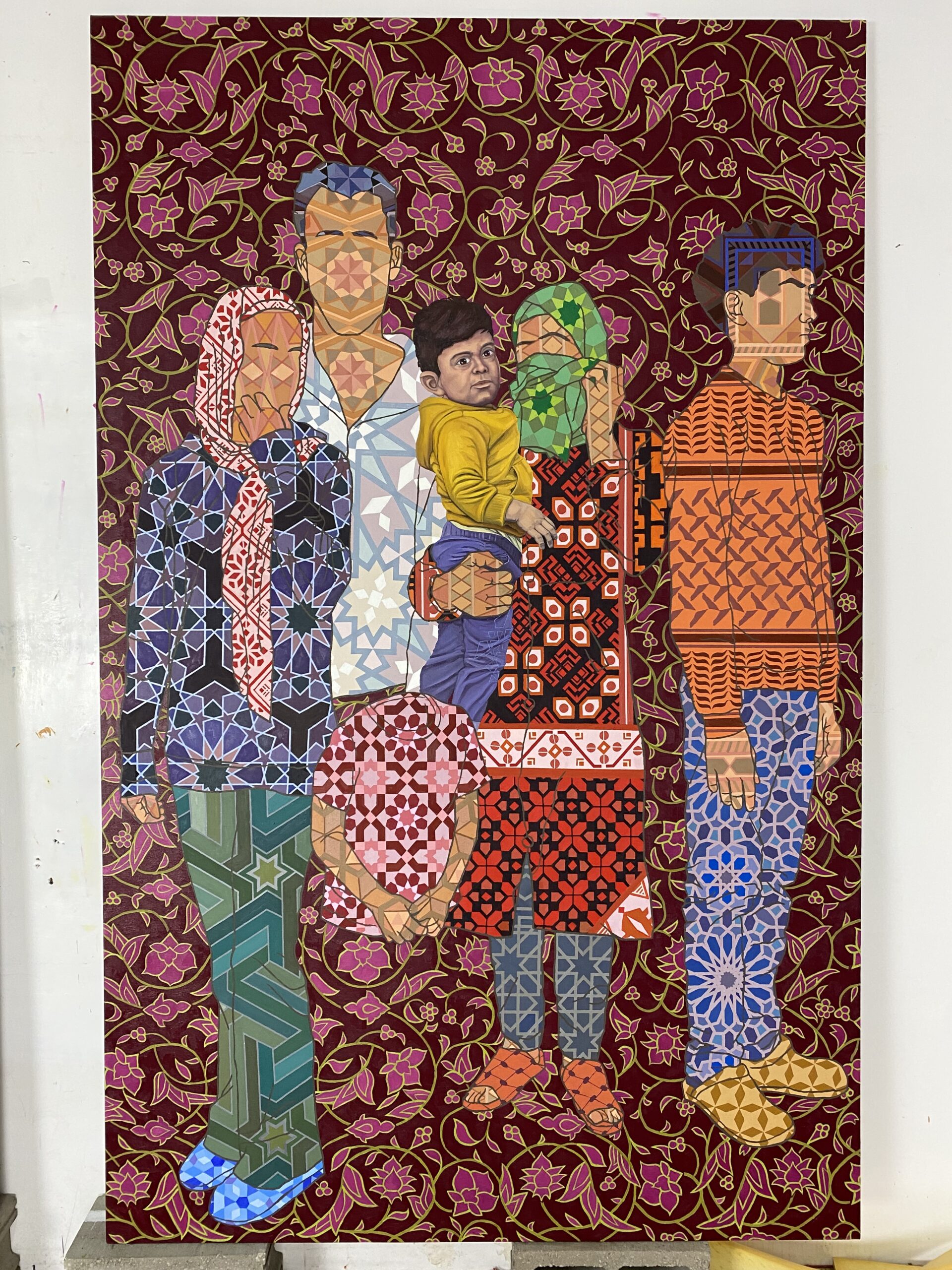
The two canvases called, “Pattern of Families Divided by the Greater > Than / Less < Than” are part of the We Energies Foundation Art Collection, curated to portray the characteristics, culture, people and landscapes of Milwaukee and the surrounding region.
Such fragmentations and implementations reflect the tragically warped senses of home, family and identity that come with leaving everything behind, becoming refugees in crisis and navigating representation in the US – all traumas shared by many from countries affected by war and American involvement in the Middle East.
“Your whole family is a unit that you have to keep intact – mentally and physically – while moving from place to place,” Kasir contemplates. “There’s a lot of dynamic shifts that happen in a family’s relationships as those decisions are made. Families get separated, and some of them can get left behind. I try to portray that in the piece.”
Kasir often references math in his work, whether it is through the designs or the titles. “Math and algebra came from the Middle East during the Babylonian era, and I want to give people a sense of what Arab culture has given to the world,” he shares. “I don’t normally name my work until after I finish it, but they needed a title when I was about halfway done, and I used ‘patterns’ in the title because that was what everything started out as before I painted in the figures.”
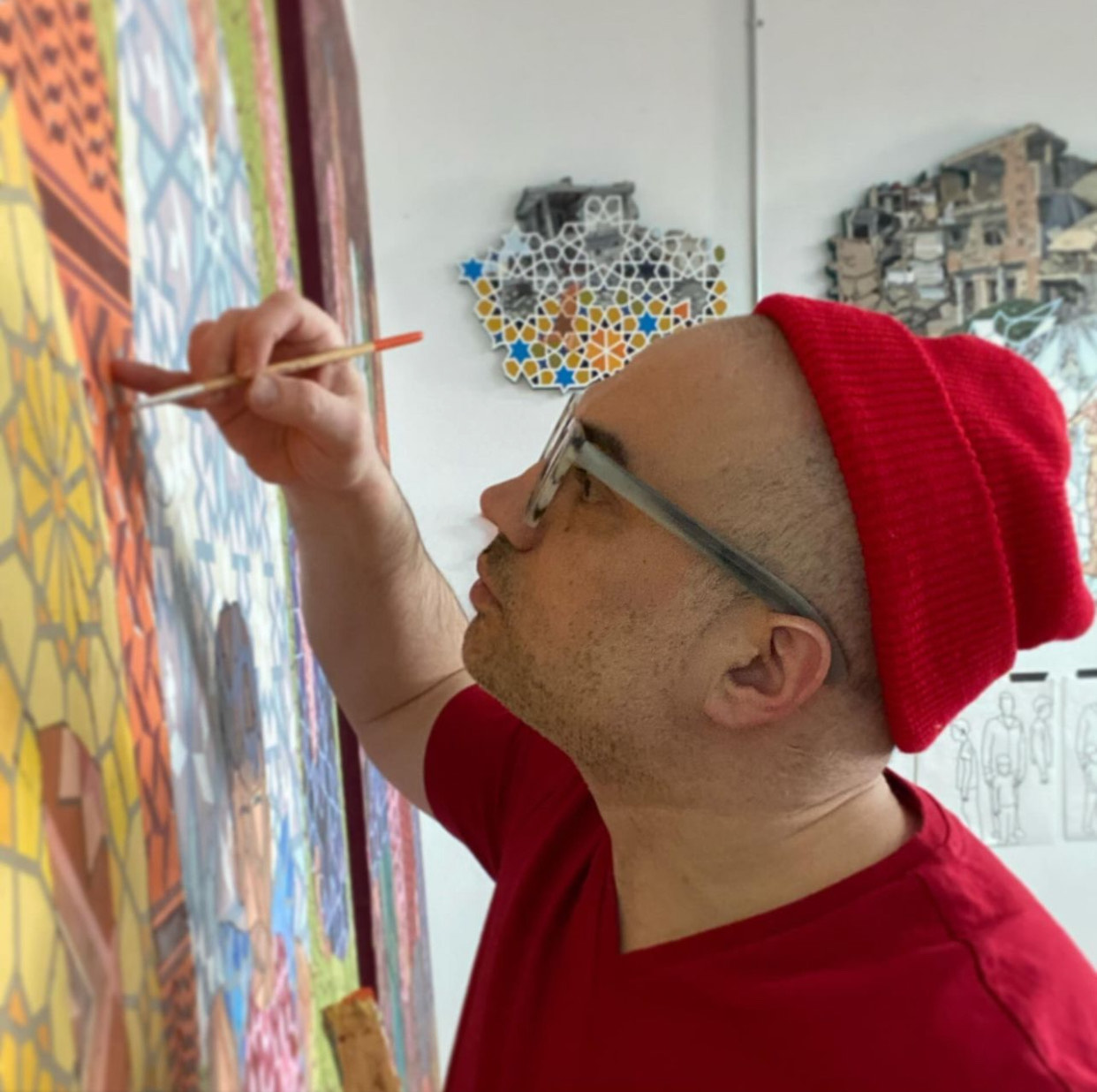
Artist David Najib Kasir
A father himself, Kasir identifies heavily with the parents who have invested so much into their children and families only to have everything ripped away from them by the horrors of war. Those parents look at their children no different from how he looks at his own. “Being a father has made me a better painter,” Kasir affirms. “Building both of my daughters’ lives has taught me the hard work that goes into creating life and maintaining lives.”
It is for this reason that Kasir finds the nature of “A Pattern of Families Divided by the Greater > Than / Less < Than” relevant to the ongoing genocide in Palestine. “When I see a dead child, I get devastated thinking about the two parents who put so much into teaching and loving that child,” he contends. “It seems so unimaginable. I don’t see how all parents couldn’t see their own kids where they see these Palestinian kids, or kids anywhere a disaster is taking place for that matter.”
With the Republican National Convention (RNC) coming to Milwaukee in just a couple of weeks, Kasir anticipates that those in town for the convention will come across his paintings. “I’ve been doing this a while, and I don’t necessarily expect someone to have a life-altering change of heart when they see work like mine,” he ascertains. “I do know that my work has connected with people, and I’ve always appreciated that. It has made people feel very strong emotions. I’ve seen people cry from seeing it.”
He continues, “But politicians are a different beast. I don’t really expect them to be ‘people’ anymore, and that goes for both sides. Within the last however-many years now, we’ve seen politicians connect less and less with normal society and regular people in general. In that respect, I don’t expect real feelings from them or for them to understand my work. I could hope that they do, where they look at my work and see a struggling family full of love and desperation, but I expect them instead to vilify anything that doesn’t look like them. That’s what they’ve given us for most of my adult life.”
David Najib Kasir has made an active effort in using his platform to support Palestinian relief efforts. Since October he has been selling paintings he previously made for 30x30x30 exhibitions at Milwaukee’s Var Small Works Gallery to raise money for Gaza funds. “I was able to raise a couple thousand dollars,” he confirms. “But I still have a lot of them left.”
Kasir also has work on display currently at Hawthorne Contemporary in Milwaukee’s Walker’s Point with the installation “Tears Like Watermelon Seeds” featuring several other local artists as well. The gallery is holding an auction for several pieces, donating proceeds to help Gaza.
Visit David Najib Kasir’s website at davidnajibkasir.com. Follow him on Instagram @davidnajibkasir.
